

National Grange Launches Rural Life Initiative Grants
by Philip J Vonada National Grange Communications Director
The National Grange is doubling down on its commitment to revitalizing rural communities with the launch of two new competitive grant opportunities through the Rural Life Initiative
On June 24, during the “GPS to Success” webinar, National Grange President Christine Hamp announced the launch of two new grant opportunities as part of the expansion of the Rural Life Initiative (RLI), a program designed in partnership with Grange Advocacy to strengthen rural communities through health, wellness, agriculture, and community projects and events.
If you missed the webinar, it is available to watch on the National Grange YouTube channel
Following the 2024 successes of programs in seven pilot states and nearly 25 Granges that received mini-grants for holiday events, the National Grange is expanding the RLI program and eligibility for all Granges.
Successful examples of past projects include senior fitness classes, building Grange awareness at a community zucchini race event, vaccination and wellness clinics, a cancer research fundraising 5K, and more.
The grant opportunities are as follows:
$1,000 Summer Grants (30 available)
• Projects must be completed and report submitted by September 30, 2025
• Applications reviewed as received. Must apply by July 31, 2025.
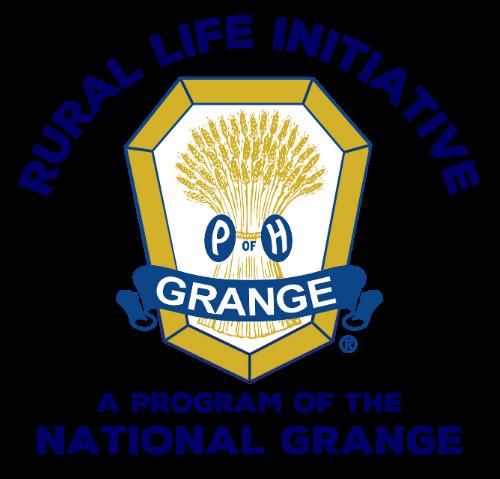
$5,000 Long-Term Grants (2 available)
• Projects must be completed and report submitted by December 31, 2025.
• Applications are due by July 31, 2025, with notification of grant winners on August 8, 2025.
Both grant opportunities are open to either local or State Granges.
While the main grant amounts are fixed, there are additional incentives available for completing projects and submitting reports on time, and for each new member gained through your project.
What are the grant requirements?
Because RLI aims to build stronger communities across the country, there are three main components to the grants:
• You must include at least one partner organization beyond your Grange.
• You must submit a current membership list with the application proposal.
• You have the flexibility to choose topics based on local needs, but:
continued on page 2


Rural Life Initiative Grants
• Projects cannot involve building improvements or equipment purchases.
• Projects must focus on recruiting and engaging new members.
• Projects must connect to at least one Project Sustenance pillar (Food Security, Community and personal resilience, Self-sustainability).
Tip: Watch the Introducing Project Sustenance webinar for more information on these topics.
“We are excited to see what Granges will create for their communities,” said
Hamp. “The flexibility of this grant cycle encourages Granges to truly think outside of the box and the Grange ‘norms.’ I look forward to seeing the dynamic events and powerful programs that this grant helps make possible.”
During the June 24 webinar, presenters Beth Westbrook and Nona Bear offered guidance on how local Granges can apply for these grants, develop project ideas that align with the program’s mission, and measure community impact. Participants were encouraged to think creatively and collaboratively in identifying rural needs and proposing solutions.
The tips and tricks presented also encouraged Granges to go after other
community-based grants, always aiming for success.
“These grants are about investing in the people, traditions, and future of rural America,” said webinar leader Beth Westbrook, a member of the Grange Advocacy Board of Directors. “By empowering Granges to take action on local priorities—from health to heritage— we’re building stronger, more connected communities.”
To watch the full announcement, visit the National Grange YouTube channel and view the full grant requirements and submit your applications at the Rural Life Initiative page on the National Grange website.
Opinion: Cancer Care Shouldn’t Depend on your ZIP code
by Lily Thomas National Grange Intern Political Science major, Kutztown University of Pennsylvania

Last year, I spent the majority of my days in a cancer treatment center receiving chemotherapy for acute promyelocytic leukemia (APL). Five to six days a week, I underwent treatment that saved my life. It was intense, exhausting, and sometimes terrifying, but I was lucky–I had access to a facility close enough that the daily trips did not completely consume my life.
As I lay in the treatment center, I often thought about what my experience might have been like if I had lived just a few counties away, in a more rural area, where hospitals are scarce and oncologists even more so. For many rural Americans, battling cancer isn’t just a medical crisis. It’s a logistical, financial, and emotional one, exacerbated by distance, time, and lack of local treatment options.
Cancer doesn’t discriminate by geography, but outcomes do.
Today, cancer deaths are 14% higher among rural Americans compared to those in urban areas. Survival rates for all cancers are 8% lower in rural communities. These aren’t just statistics; they represent real people and the people who love and care for them. Mothers, fathers, grandparents, and children whose lives are cut short, not because treatment doesn’t exist, but because it’s out of reach.
The challenge isn’t just about hospitals. Nearly 200 rural hospitals have closed in the last 15 years, and hundreds more are hanging on by a thread, especially today, due to proposed cuts
to vital funding. Even when a rural hospital is readily accessible, it may not offer the advanced treatments cancer requires. Chemotherapy, radiation, immunotherapy, and clinical trials are often only available at larger urban cancer centers, often hours away.
Some patients try to temporarily relocate near the treatment center, but that assumes they can afford time away from work, housing costs, and travel expenses. Others will delay treatment, space out appointments, or skip them entirely, which can all be fatal. These consequences are heartbreaking and preventable
For a farmer whose day begins before sunrise and is dictated by the needs of their land and livestock, a multi-daya-week treatment schedule in a city two or more hours away is inconvenient, unworkable, and financially unreasonable. Missing one day might mean a lost harvest. Missing a week could mean losing your livelihood.
This challenge isn’t unique to farmers. Essential workers across rural America—truck drivers, teachers, construction workers, nurses, firefighters, and restaurant staff are the backbone of our economy. While some may have slightly more flexible schedules, extended time away for treatment can quickly cripple a family’s financial stability. The cost and time required to travel long distances for care, often across county or state lines, are simply not feasible. This leads to the same phenomenon seen across rural America: delayed treatment, deadly circumstances.
Some patients try to temporarily relocate near the treatment center, but that assumes they can afford time away from work, housing costs, and travel expenses. Others will delay treatment, space out appointments, or skip them entirely, which can all be fatal. These consequences are heartbreaking and preventable.
There are steps we can and must take now to close this
continued on page 6

Have you registered? 159 Annual National Grange Convention th November 8-16, 2025
The 159 Annual National Grange Convention will be here before you know it! th
Sailing from Miami to the Caribbean islands of Aruba, Bonaire, and Curacao, this one-of-a-kind convention blends business with fun, fellowship with learning, and so much more.
Whether you're a longtime Granger or a friend or family member, this unique setting offers unforgettable opportunities to connect, grow, and be inspired. With engaging workshops, meaningful meeting times, and moments of celebration - not to mention everything Carnival has to offer - there’s something for everyone on board. You’ll leave energized with fresh ideas, lasting friendships, and a deeper connection to our mission. Don’t miss your chance to be part of Grange history on the high seas!
Updates are being posted regularly on social media and on the main information page. So visit today to be sure you’re registered.
Visit: https://www.nationalgrange.org/159ngconvention today!
Reserving your cabin does not register you for the convention. Make sure to do both!
Date
Saturday, November 8
Sunday, November 9
Monday, November 10
Tuesday, November 11
Wednesday, November 12
Thursday, November 13
Friday, November 14
Saturday, November 15
Sunday, November 16
Some National Grange Events*
Saturday, November 8
Registration of all attendees
Sail-Away Party
Sunday, November 9
Opening of Session
President’s Addresses
Tuesday, November 11
Assembly of Demeter Business Meeting
Wednesday, November 12
Conferral of the Seventh Degree & Assembly Convocation
Friday, November 14
Election of Officers
Saturday, November 15
Opening of Session by Youth Officers
Installation of Officers
*registration required

National Grange Policy Updates & Issue News
June 2025
Agriculture and Food
Farm bill provisions hit a snag
Commodity price support and nutrition assistance sections of the farm bill have been included in the budget reconciliation package moving through Congress. Actions by both the House and Senate Agriculture Committees would make massive cuts to the Supplemental Nutrition Assistance Program (SNAP) and use part of those savings to increase commodity support prices. SNAP benefits would also be eliminated for immigrants who aren’t citizens or who do not have legal permanent residency. The legislation would impose a state cost-share for SNAP payments and place new administrative burdens on many counties.
The reconciliation package cleared the House in late May, and the Senate has targeted passage before Congress’ July 4 recess. However, the Senate parliamentarian invoked the Byrd Rule and prevented the Senate from imposing a state cost-share, negating a major source of spending cuts for the legislation. The immigrant assistance SNAP ban was also ruled out of order. The Byrd Rule, established in 1985, forbids Congress from including provisions in budget reconciliation that are not primarily budgetary.So, it was back to the drawing board for commodity price supports, SNAP, and several more provisions that have been ruled out of the budget reconciliation package by the Senate Parliamentarian. As of the week of June 24, the Senate Ag Committee had made revisions to the SNAP cuts provisions that subsequently won the parliamentarian’s approval. This clears the way for SNAP cuts and additional funding for commodity price supports. The Senate is constantly negotiating these and other reconciliation package revisions with the House and plans to begin voting on the legislation on June 27. The goal is to have the reconciliation bill on the President’s desk by July 4.
Alarm sounded on New World
screwworm
New World screwworm fly larvae burrow into the flesh of living animals, causing serious and often deadly damage to livestock, pets, wildlife, occasionally birds, and in rare cases, people. The pest was eradicated from the U.S. in the 1960s and contained to South America using sterile fly technology. However, screwworm was detected in southern Mexico late in 2024, causing alarm that it could again spread to the United States. In mid-June, Agriculture Secretary Brooke Rollins announced efforts to combat the northward migration of the screwworm that include:
• Build a sterile fly production facility at Moore Air Force Base in Texas.
• Renovate an existing fly production facility in Metapa, Mexico, to support an existing facility in Panama.
• In-person visits to audit Mexico’s animal health controls.
• USDA cattle fever tick riders along the southern border will collaborate with Customs and Border Protection and state partners to intercept stray and illegally introduced livestock.
Healthcare
Medicaid cuts expected to batter rural health care
Massive cuts to the Medicaid program that are being proposed in the budget reconciliation package moving through Congress will have a devastating effect on the future of rural health, according to our friends at the National Rural Health Association. More than 300 rural hospitals would be pushed toward a fiscal cliff by the legislation. Rural Americans are more likely to depend on Medicaid than the general population. Rural patients tend to be uninsured or underinsured and, therefore, unable to pay the full amount of the rural hospital service. Providers then look to Medicaid to cover those costs. The National Grange is waging a high-profile public campaign to raise awareness in Congress and mitigate the severity of those cuts. The legislation also aims to reduce waste, fraud, and abuse, as well as initiate new work requirements, which the Grange policy does not oppose.
Hamp op-ed hits D.C. press
National Grange president Chris Hamp penned an opinion editorial that ran in the DC Journal and highlighted the consequences of massive Medicaid cuts. She pointed out that a large number of rural families lack access to employer-based health care benefits. Private insurance remains out of reach for small business owners, ag workers, machinery operators, day laborers, and many others. She concluded by pointing out that every American, regardless of their zip code, deserves the dignity of timely, affordable health care, and Medicare makes that possible for millions in rural communities.
Why not a rural hospital carve-out
Senate Republican leaders are working to assuage a group of reconciliation package holdouts who are concerned with the rural consequences of such deep Medicaid cuts. The holdouts include Collins of Maine, Hawley of Missouri, and others. The Grange is asking why not create a legislative carve-out for rural hospitals?
Immigration/Ag Workforce
Whiplash on the farm and ranch
Undocumented ag labor has been vital to food production in America for decades as the domestic workforce found easier, better-paying jobs elsewhere. As recent deportation efforts by
the federal government escalated, farms and ranches began to report raids by the Immigration and Customs Enforcement (ICE) division of the Department of Homeland Security (DHS). The overwhelming majority of these undocumented workers are neither criminals nor part of recent waves of illegal immigration across our southern border and have been working here for years, according to farm and ranch employers. In early June, President Trump announced that farmworkers who are in the country illegally should not be deported. A memorandum from an official at DHS to regional ICE offices followed that said, “Effective today, please hold all work site enforcement investigations/operations on agriculture (including aquiculture and meat packing plants), restaurants and operating hotels.” A few days later, a call from ICE and DHS officials to agency leaders indicated that agents must continue conducting immigration raids on agricultural businesses, hotels and restaurants. The apparent reversal by DHS means there’s a lot of internal dialogue happening at the White House. The National Grange is a member of the Ag Workforce Coalition, which is seeking clarification of the administration’s policy. There is some indication that ICE is primarily after those individuals with criminal records rather than long-term workers. If that’s the case, producers are telling the coalition they will gladly cooperate with ICE efforts, but are also asking ICE to leave their non-criminal workforce alone.
Taxes
Grange policy supports tax cuts
TThe National Grange member-derived policy supports the tax cuts provisions moving through Congress as part of the budget reconciliation package. The Grange and 44 other members of the Tax Aggies Coalition sent a letter to the House leadership and the Chairman of the House Ways and Means Committee, thanking them for their efforts to advance tax provisions needed by farmers, ranchers, and small businesses. A similar letter was sent to the Senate leadership and the Chairman of the Senate Finance Committee. Several of the key tax relief provisions include estate tax relief, qualified business income deduction, lower tax rates, increasing Section 179 expensing allowance, and restoring 100% bonus depreciation.
Telecommunications
Use all technologies to reach the last mile of country road
This is the member-derived National Grange policy on broadband deployment. The preference, of course, is to use fiber where it is practical and cost-effective. Where it is not because of
topography or distance, let’s get on with connecting rural families, farms, and ranches in remote areas with other technologies. That has been the Grange drumbeat for the past several years. On June 24, Nebraska Grange member Matt Peterson joined panel members from the Connect Everyone Coalition on a national webinar to explore the features of low Earth orbit satellites to deliver high-speed broadband to unserved and underserved remote areas. Then, as USTelecom president and CEO Jonathan Spalter said recently, “Our government should be concerned with outcomes for the people and not endless processes, regulations, and delays. The only thing stopping us from connecting everyone in this country -expanding their opportunities and improving the benefits for everyone- is too much delay and inaction and not enough GSD (Get Stuff Done).”
Of Interest...
“Make America Healthy Again” report questioned Efforts by Health and Human Services Secretary Robert F. Kennedy Jr. to make America healthy again have run into trouble. Secretary Kennedy leads the Make America Great Again Commission established by President Trump. The highly anticipated Commission report on the potential drivers of childhood chronic diseases criticizes many aspects of the food system, including the role of ultra-processed foods, added sugars, food dyes, seed oils, food additives, and chemical contaminants. However, the report cited some nonexistent and erroneous studies. Apparently, much of the report was generated using artificial intelligence (AI), which resulted in numerous errors. The Commission is expected to correct the errors and develop a federal strategy that includes more definitive policy recommendations.
View From the Hill is written and compiled by Burton Eller
National Grange Legislative Director beller@nationalgrange.org
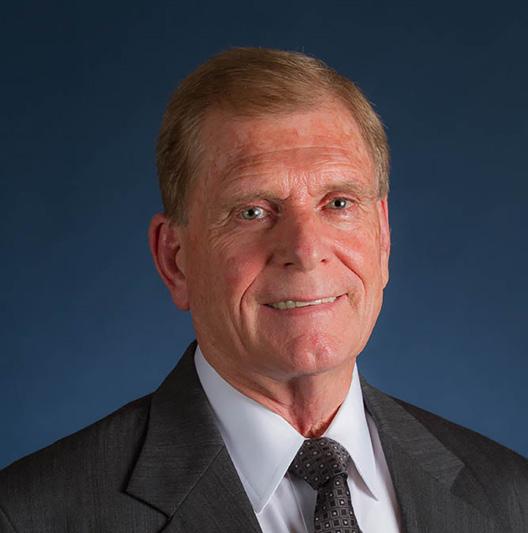
Perspectives
“We never know the love of a parent till we become parents ourselves.”
- Henry Ward Beecher, American Congregationalist clergyman, social reformer, and speaker
“Little League baseball is a very good thing because it keeps the parents off the street.”
- Yogi Berra, American Baseball Hall of Famer
“We are the people our parents warned us about.”
- Jimmy Buffett, American singer-songwriter
“My heroes are and were my parents. I can’t see having anyone else as my heroes.”
- Michael Jordan, American basketball player and businessman
Opinion: Cancer Care
deadly rural cancer care gap.
One is for Congress to expand access to MCED screening tests by passing the Nancy Gardner Sewell Medicare Multi-Cancer Early Detection Screening Coverage Act. MCED tests can identify dozens of cancers through a simple blood draw. For several years, the National Grange has been a powerful advocate for these early detection policies. These screenings, regardless of age, would become a game-changer for rural patients. Catching cancers before they advance to late stages that require intensive treatments. Early detection is one of the most effective and efficient tools we possess to save lives, especially in communities where access to treatment is limited.
Rural patients should have access to oncologists and cancer care teams. We must make it easier for oncologists and cancer care teams to practice in rural areas. Loan repayment programs, rural training tracks, and incentive-based placement programs can help bring specialized care to rural communities. Investing in regional cancer hubs or largenetwork-based magnet clinics within reach of rural communities is another practical step.
Mobile cancer units and telehealth programs should be supported and expanded, bringing care directly to
patients instead of the other way around. And where long travel is still necessary, we must advocate for travel stipends, lodging assistance, and employer protections for patients and their caregivers.
These solutions are not just possible, they are moral imperatives. No one should be forced to choose between saving their life and saving their livelihood. Rural Americans are the backbone of this country. Highlighting the crucial issues facing them is essential to the continued prosperity of rural and smalltown America.
The National Grange has always stood for rural dignity, access, and fairness. That mission feels even more personal to me now. My journey through cancer treatment has shown me both how rigorous the fight is and how strenuous it would have been without access to care. For too many rural Americans, the cancer battle starts with a map, not a medical chart.
Cancer care shouldn’t depend on your ZIP code. It’s time we start confronting the realities that rural Americans face in times of critical situations, and act on them.
Lily Thomas is a senior Political Science major at Kutztown University of Pennsyvlania. She is a intern with the National Grange for the summer, in partnership with The Washington Center.

Grange Member Benefit: HarvestHosts
Harvest Hosts is a membership program that offers RVers unlimited overnight stays with no camping fees at 5,500+ unique locations across North America. From peaceful farms and animal sanctuaries to wineries, breweries, drive-in theaters, and museums, members enjoy memorable experiences while supporting small businesses. Each host offers a unique setting to relax, explore, and connect with local culture. Some locations even allow extra nights or offer electric hookups for a small fee—perfect for when you want to stay just a little longer.

National Grange members can enjoy 20% off their first year of membership with code GRANGE20 at checkout. Click here to learn more!

National Grange kicks off celebration for America’s 250th with “Red, White and You” Campaign
By Amanda Brozana National Grange Membership & Leadership Development Director
The Grange is a deeply patriotic institution. This ideal was sewn into its identity from the founding vision of an organization that would mend a tear in the American fabric and build a stronger union.
Today as the U.S. is preparing to celebrate the 250th birthday of our nation, the call to honor this milestone comes both personally and to each chapter through the Grange’s “Red, White and You” Campaign.
Earlier this year, National Grange President Chris Hamp established the America’s 250th Grange Workgroup to provide suggestions and assist in directing pieces of the Grange’s celebration activities. First up is the collection of photos of members dressed in red, white or blue to create an American flag photo collage.
Celebrating Red, White & You!
Get out your red sweater. Or your white shirt. Or your blue dress. It’s time to show your patriotism and become part of the Grange’s American flag collage. It’s simple: Wear a shirt, dress or outfit of primarily one of the three colors, then take a photo on a smartphone or digital camera and submit it at https://grange.biz/redwhiteyou
Provide as high-quality an image as you can. Submit by December 4, 2025. The collage image with a celebratory message will be available starting January 2026.
In the fall, the America’s 250th Grange Workgroup will produce a coloring page that Granges can use as they see fit – from engaging Junior members in a discussion about American values and providing the page for younger children to sponsoring a local school contest.
“We want to make the options flexible to fit each Grange’s needs,” said workgroup chairwoman Lois Barber, of Kansas.
You’ll also find recipes in upcoming issues of Grange Today!
and on the soon-to-launch Grange Engage platform. These recipes, that “strike a chord as American staples or celebrating the best of American agriculture,” according to Barber, will be pulled from Grange cookbooks and contests.
Granges at all levels are also encouraged to use the American Flag Junior Passport as inspiration for a Lecturer’s Program or even a community event. (Can be found at https:// www.nationaljuniorgrange.org/junior-grange-passport/)
The workgroup is also suggesting each Grange hold a picnic or fellowship event to celebrate the freedoms we enjoy as Americans to assemble, discuss and pursue happiness.
They also encourage Granges to continue to honor veterans in the ways that fit their membership and community – holding a presentation or recognition event, offering discounts at Grange events, or presenting Quilts of Valor to name a few.
Hamp said the contests and activities are an excellent way to participate “out loud,” but she is also encouraging members and citizens of the nation to go much further.
“Celebrating the nation’s semiquincentennial is not just about doing so in our halls or our meetings. It’s about living every day as a citizen committed to the American ideals of liberty, democracy, justice, equality and self-determination,” Hamp said.
Hamp has written the first of a series of op-eds on the importance of being actively engaged in the democratic process and living the American ideals, including engaging in and encouraging civility in our interactions with all.
“If one does nothing else to celebrate 250 years of American freedom, independence and self-governance, every one of us should commit to civil interactions with others at all times, especially when we find we disagree,” Hamp said.
Hamp encourages each member to read the op-eds as they are released and share them during meetings, with local news outlets, with the library and with friends and neighbors.
More suggestions for semiquincentennial celebrations will be posted to the Grange Engage platform and in future Grange Today! issues. You can submit details of the way in which your Grange is celebrating through Grange Engage beginning in the fall.
45 Degrees North: Parade Protocols
Small-town parades make great memories for young and old alike. But how well do you know the protocols for chair positioning, candy throwing, and beer floats?
by Donna Kallner
Originally published in The Daily Yonder
Like many kids who grew up on farms, I remember decorating hay wagons with our 4-H club and riding those floats in parades that featured marching bands, convertibles, tractors, and politicians on foot. Those long-ago Hoosier parade organizers probably delighted in staging the politicians after the horses so they had to step lively over the “road apples”.
Now I live in rural northern Wisconsin near a village where the 4th of July parade is like a homecoming block party with slow-moving vehicles, including a beer float. That’s right: Handing cold beverages to adults along the parade route is as much a tradition here as throwing candy to kids.
Small-town parade organizers don’t get nearly enough credit for the miracles they work. It helps to have the skills of a drill sergeant or a kindergarten teacher when you’re the one responsible for making sure that fire trucks are staged where they won’t be stuck in traffic if they get a call, that marching bands are far enough apart to be heard one at a time, or that no one brings a float so long that it can’t make a sharp turn without scattering people who thought that was a good place to park their lawn chairs.
It may look effortless. It’s not.
But here’s the thing about the volunteers behind the scenes of a smalltown parade: They know which members of the VFW (Veterans of Foregin Wars) color guard probably shouldn’t try to walk the parade route and have graceful ways to get them to ride instead. They know that putting Little League kids near the front means they’ll be positioned at the end to get any candy other parade participants have left over as they finish the route. They know where the grand marshal’s out-of-state grandchildren can get a great view as that convertible passes by and maybe end up sitting next to folks who have stories to tell of that

honored elder’s high school hijinks. They know how to make treasured memories.
We can help them by remembering a few points of parade protocol.
Be prepared to walk. You might have a bit of a hike from where you can park to where you want to watch the parade or find a place to potty. So put a little thought into portability, wear comfortable shoes and a hat, and potty before you get ready to settle in.
Respect private property. Folks who live along the route may have family and friends who join them to watch from there. They’ll be setting out chairs early while they’re in and out, putting things in the oven and fridge. So if the chairs are empty but the front door is open, maybe move a bit further down the block to another address where the folks are gone or inside waiting for the hubbub to be over.
Driveways, mailboxes, fire hydrants. Rural mail carriers generally know to work around a parade schedule. But occupants, caregivers, and others may need access to a driveway or mailbox right up to the time the parade starts. Be prepared to shift as needed. And if your rural town
is lucky enough to have fire hydrants, be prepared to skedaddle your party and all your stuff if the fire department needs access.
Respect your elders. In small towns, we expect everyone to treat the old folks with extra consideration at parades. So if they’ve set up lawn chairs on the sidewalk, don’t block their view by standing in front of them. You can ask if you can sit on the curb without being in their way. If that’s okay, don’t obstruct their view by holding up a cell phone while shooting an epiclength video. Keep your language and behavior appropriate, and you might just get a standing invitation to watch the parade from there every year.
Kid concerns. The general protocol at parades is to let small children in front so they can see, and having parents stay within reach, paying attention to their offspring. Because no matter how well you try to prepare little ones for the parade environment, kids can be unpredictable. And if you put headphones on them to protect their hearing from sirens, rumbling engines, and other
continued on page 13
A young boy anxiously waits (for candy!) on the side of the road as a parade approaches in a rural community.
Photo via AdobeStock

THIS COULD BE YOU!

HOW TO ENTER
You could be one of the special guests chosen to represent a National Grange of ficer during the closing of the second day ’s business of the 159 Annual Convention on Monday, Nov. 10 at 4 p.m.!
Make a $25 donation to the Grange Foundation General Fund between June 21 to Nov. 2, 2025, and you will have the opportunity to receive a priceless experience serving as a National Grange Officer during the closing ceremony.
9 donors will be drawn. (Each individual $25 donation counts as a separate opportunity for the drawing).
You (or someone you choose) must be present at Convention aboard the Carnival Horizon to take part
Winners will be notified on Monday, Nov 3 and have until Thursday, Nov 6 to accept or notif y the National Grange of their stand-in selection.
If you are assigned a speaking or active role, you should be prepared to perform the duties either from memory or using the manual .
Why are there not 17 being chosen?
National Grange President Christine Hamp offered the National Officers the first opportunity to donate $100 and give their sash to somebody of their choosing!
The following officers claimed their sashes for mentors, friends and loved ones: President , Vice President , Lecturer, Assistant Steward, Lady Assistant Steward, Secretary, Gatekeeper, Ceres
The following offices will be chosen from new donors: Steward, Chaplain, Treasurer, Pomona , Flora , and four Executive Committee members.

Hamp Watch: Where is our National Grange
President this month?
This monthly feature will highlight where National Grange President Christ Hamp has been and what she’s been up to in the month prior. Want to see her in your neighborhood or at your Grange event? Email her at champ@nationalgrange.org.

May 31: Serving up Supper for the Trail Riders. Lending a hand at the Ralston Grange #943 (WA) BBQ supper for the John Wayne Trail Rider Club was Duane Hamp, Chris Hamp, and Mitch Clouse. Western tradition meets smalltown generosity – a slice of the frontier served with seconds.

June 5: with Beth Westbrook (standing) and Nona Bear (seated) in my office at the National Grange Headquarters, Washington, DC.
The opportunity to meet in person with two of my greatest mentors was a reminder of the guidance, encouragement, and belief that helps shape this journey I’m on. Their wisdom, humor, and steady support have been a compass through challenges and growth. Grateful, grounded, and growing thanks to the people who lift us higher.
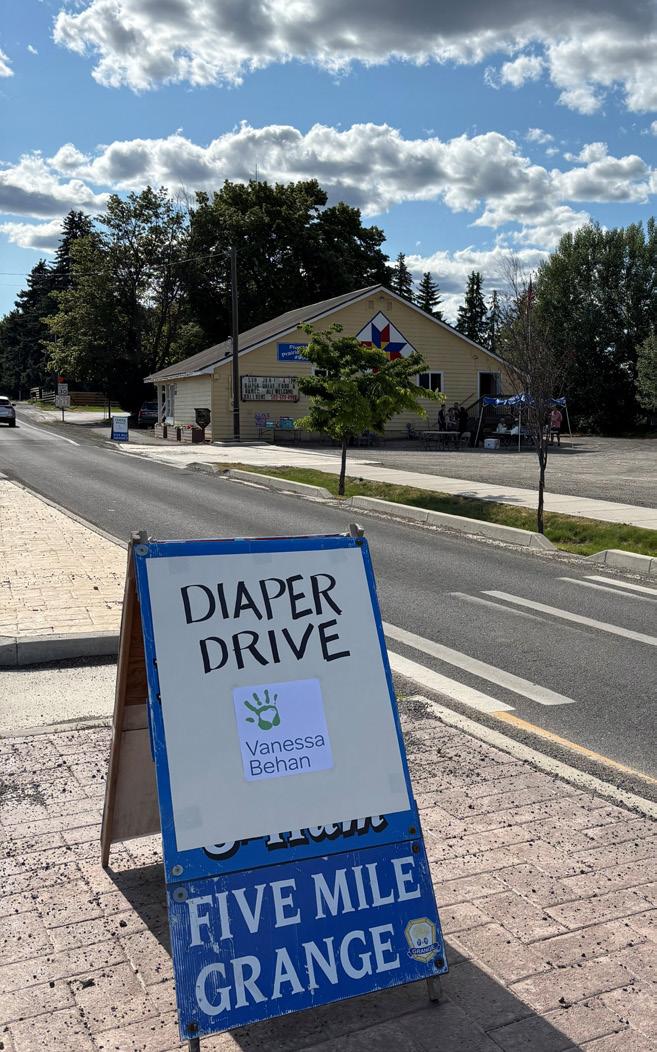

June 2: A component of every trip to our National Grange headquarters in Washington, DC is a walk down, across, and around the National Mall – reflective, inspiring, and humbling –where history meets the present with every stride.
June 1: Community kindness in action – the Five Mile Prairie Grange #905 (WA) rallied neighbors for a diaper drive benefiting the Vanessa Behan crisis nursery.
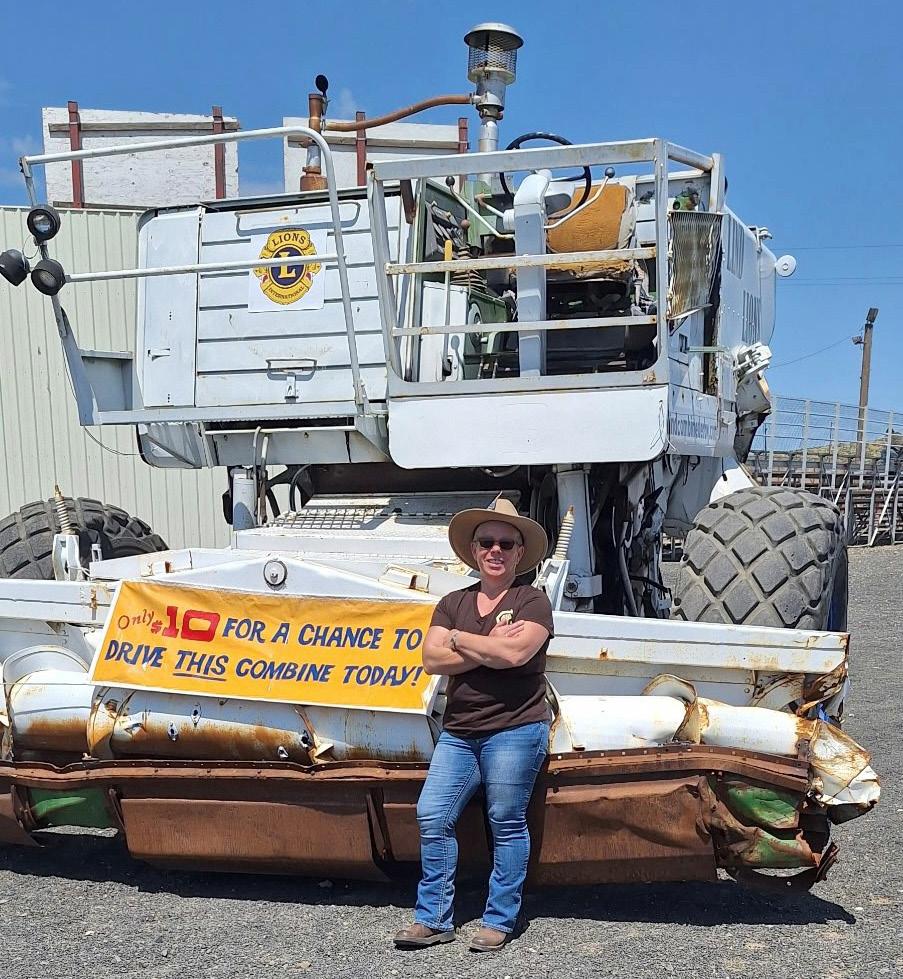
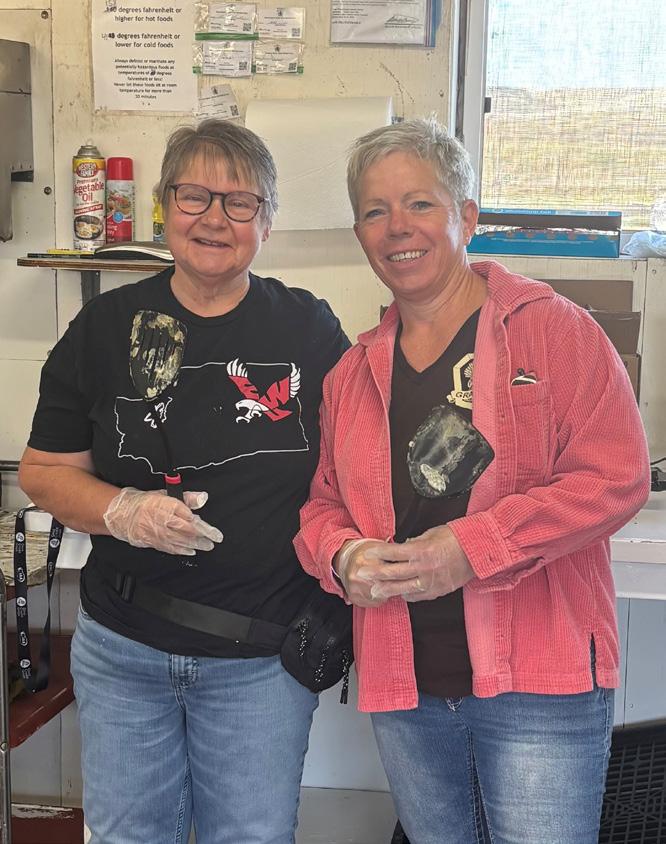
June 14: Iron and adrenaline. Standing next to a battle-worn combine at the legendary Lind Combine Derby was pure adrenaline and agricultural pride. Part demolition derby, part hometown tradition –this isn’t just a show, it’s a celebration of farm life, toughness, and small-town spirit.
June 14: At the crack of dawn, Duane and I assisted the Ralston Grange #943 (WA) crew with serving up a hearty pancake and sausage breakfast to derby-goers at the Lind Combine Derby. More than just a meal – it was community coming together. Photo with my longest-tenured Grange friend, Codi Titus of Ralston Grange.
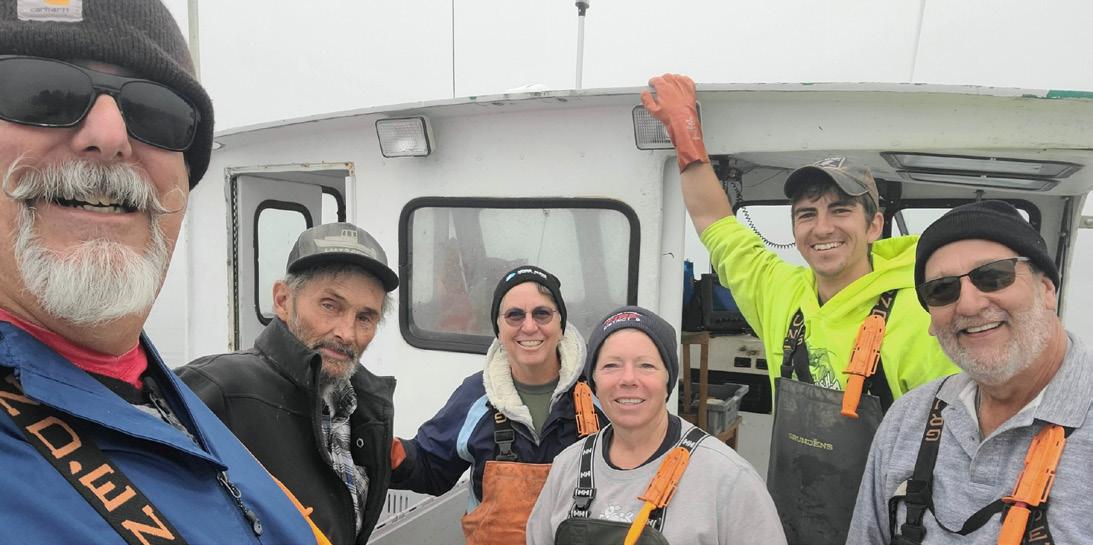
June 19: Hauling Traps and Traditions – Learning the Lobster Trade. Out on the water with John and Andrew Cox, we got a hands-on look at the hard work and heritage behind the lobster industry. From baiting traps to hauling in the catch, every step was a lesson in skill, patience, and deep respect for the sea.

June 21: Uplifting, united, and unforgettable – small town, big impact. Here we are with Rebekah Hodgson and Andrew Cox of Jonesboro Grange #357 (ME) after helping with the 5th annual Crush Cancer Lobster Crawl. A fabulous day filled with energy, hope, and hometown pride.
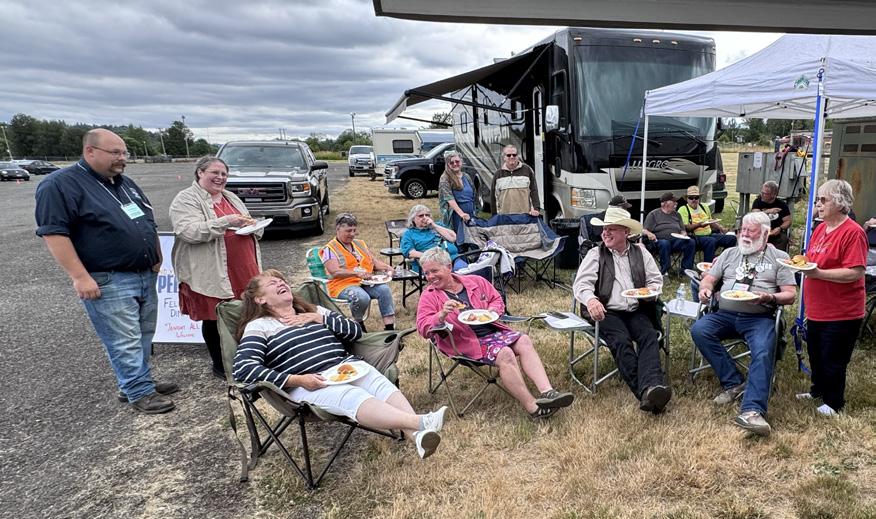
June 24: Kicking off the 136th annual Washington State Grange convention with good fellowship and plenty of food at the RV’ers Taco Tuesday potluck feast. A relaxed evening is the perfect way to reconnect and gear up for the week ahead.

June 19: Hands-on and hard work – one unforgettable day on the water. Embracing the full experience with energy, curiosity, and a grin that said it all.
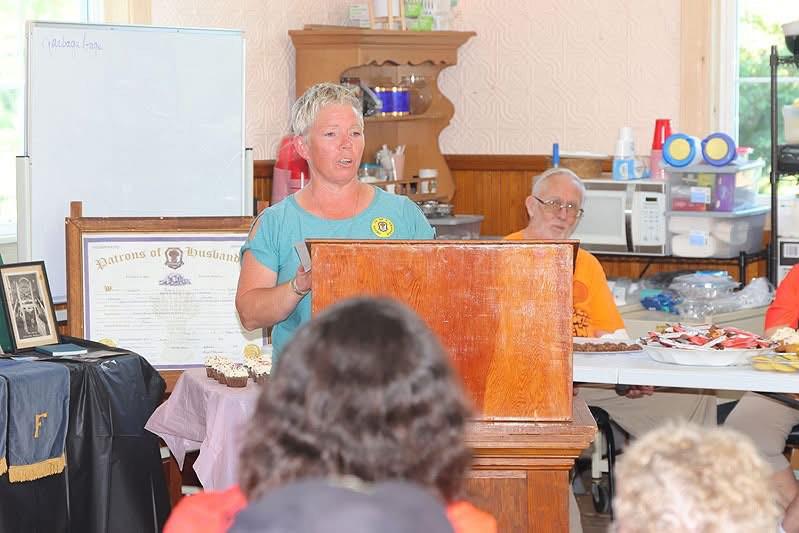

June 21: Historic, heartfelt, and deeply proud – a century and a quarter of making a difference. A proud banner hangs on the hall of Jonesboro Grange #357 (ME) celebrating 125 years of dedication to the community. A tribute to generations of members who’ve gathered, served, and strengthened their town through changing times. More than just a milestone, it’s a testament to the enduring spirit of the Grange.
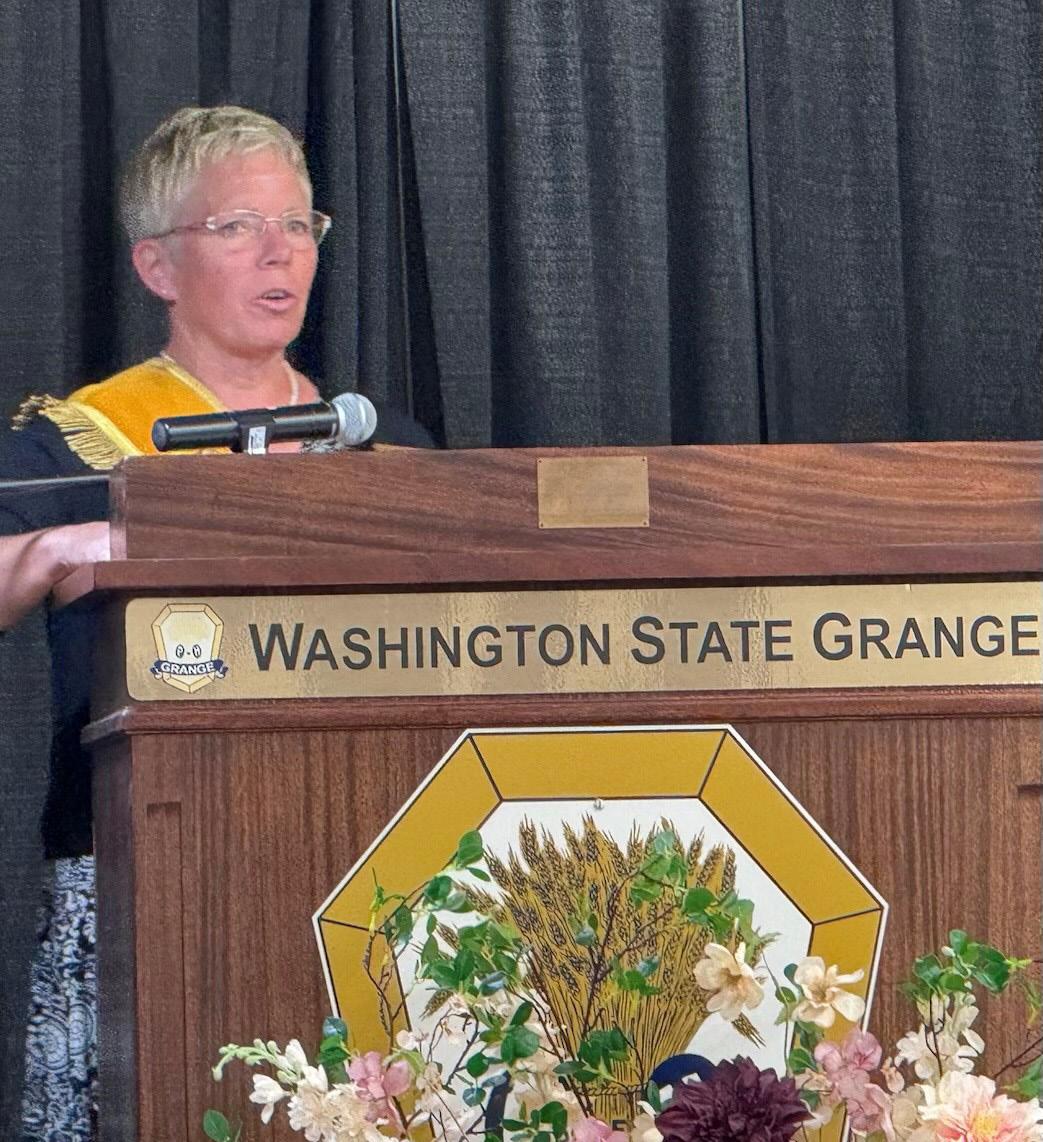
June 25: 136th Washington State Grange Convention –Opening Night Proud and deeply personal – an honor to be recognized at home – surrounded by the community that has shaped my journey. A call to action to Lead!
Participate in Virtual Learning Session on Alcohol Misuse in Women

The National Grange and Rural Minds are working with researchers at Mayo Clinic on a project to involve more women in patient-centered research on alcohol misuse. Studies show that women experience more health problems related to alcohol use than men. Unfortunately, it’s often more challenging for women to get treatment and participate in research studies for alcohol misuse.
The NNDC and Mayo Clinic are hosting a virtual event on Monday, July 14, 2025 from 6:00-7:30pm CT / 7:00-8:30pm ET for attendees to learn more and share their perspectives on the following:
• Health and treatment-related disparities in alcohol misuse among women
• Patient-centered comparative effectiveness research
• Perceptions and experiences on how to address
treatment barriers
• Perspectives on areas for future research on alcohol misuse in women
Female attendees ages 18+ are welcome to join if they meet any of the following criteria:
• Lived experience with alcohol misuse (past or current), or
• Family member of a woman with alcohol misuse, or
• Healthcare provider or trainee specializing in alcohol misuse
Attendees will receive a $150 prepaid cash card in thanks for their participation. If you are interested in attending, please register here: https://redcap2.mayo.edu/redcap/ surveys/?s=EHEEW8K9WALCNAXX
Select “Rural Minds or National Grange” to register for the July 14th session
For more information about this project, please visit: https:// www.pcori.org/research-results/2024/building-womenwiseempowering-women-through-capacity-building-patientcentered-research-alcohol-use

Support Burr Oak’s Mitten Tree
In December 2024, an article was published in Grange Today! highlighting the success of Burr Oak Grange’s new “Mitten Tree” program, in partnership with the Burr Oak Township Library.
Now, they’re back for a second year, hoping to grow bigger and better!
If your Grange, or any Granger, is looking to be a part of another Grange’s project, they would appreciate your support. Donations of hats, mittens, and scarves can be sent to:
Burr Oak Grange #1350 106 5th St PO Box 237
Burr Oak, MI 49030
All donations go to helping local children & adults, domestic assault shelters, and other organizations in St. Joseph County, Michigan.
Parade Protocol
loud noises, they may not hear parental reminders about behavior expectations. Remember watching parades perched on a parent‘s shoulders? It’s a time-honored tradition that addresses both visibility and containment. If kids outnumber grown-ups in your party, you’ll need a zone defense strategy, particularly if the parade schedule intersects with nap time.
Candy concerns. Many parades no longer allow participants to throw candy, or advise them to toss candy to the ground (so it doesn’t hit heads and eyes) as far to the edge of the roadway as possible. It’s pretty scary to be driving a fire truck or other big vehicle and have kids darting out to get candy thrown from the parade entry ahead of you.
Pets. It’s always fun to see dressed-up dogs walking their humans in a parade. It’s not so much fun to be watching a parade next to a barking dog, or to see an unleashed animal dart into parade traffic. Unless you can keep them calm and under control, it’s probably best to leave pets at home. If you do take your pet, be sure to clean up after it. Actually, the same goes for kids and poorly trained adults. Take your trash with you when the parade is over.
Knuckleheads. For whatever reason (youthful exuberance, lifelong practice at misbehaving, alcohol or other impairments), when some people get around a crowd, they turn into knuckleheads. If it’s just annoying and might wear itself out or be redirected, striking up an inclusive conversation might be more effective than even a friendly request to tone it down.
But if it feels like a problem might escalate, at a small-town parade, you’re probably surrounded by people with insights into creative ways to de-escalate the situation. Even knuckleheads generally have someone they don’t want to disappoint. If they’re not local knuckleheads, the parade organizer
continued from page 8
probably has a plan for managing minor disturbances. If she’s not in your cell phone contacts, someone nearby will have her number.

When an honor guard passes or the national anthem is playing, protocol is to stop talking, stand, remove hat and place the right hand over your heart.
Photo by Donna Kallner
Flag etiquette. Sometimes, even fine upstanding citizens are so distracted they don’t notice that it’s time to pipe down, stand up, and show respect for our country’s flag. So set an example by directing their attention, removing your hat, and placing your right hand over your heart (military members would salute). It isn’t necessary to do so for every small flag fluttering from a float. But observe flag etiquette whenever an honor guard passes or the national anthem is playing. Pitch in. One of the great things about rural communities is how people pitch in to help during an event. You can be the person who brings extra bottles of water to share and a trash bag to collect and
remove what should not be left behind, without being asked. You might also be the volunteer who offers to stage at a specific location to answer questions or address concerns that arise. For example, if hazardous weather conditions emerge it takes a village to convey information about where to seek shelter. Because on a holiday weekend with lots of outof-town visitors in for the festivities, cell tower capacity can be maxed out. Talk to the parade organizer ahead of time to offer your help as a spotter or information conduit.
If you can… When your kids or grandkids are small, it’s important to make memories with them. But when you reach a point in your life where you can, offer to help in other ways. Every parade needs people to secure permits, plan for crowd control (especially at intersections and choke points), set up safety barriers and route markings, work with law enforcement on traffic management before and after the parade, help stage the lineup at the start, assist participants, and handle emergencies. Volunteers who organize parades can burn out or age out. For these traditions to continue, it’s important to have new volunteers learning the ropes. Interested in helping but want to know more? The National Association of Counties has a helpful guide about parade safety here
The practice you get helping with something like a parade comes in handy when someone needs to coordinate some other event, like sending off a high school athletic team to tournament competition or an elderly veteran en route to a Never Forgotten Honor Flight experience.
It takes volunteers to keep beloved traditions alive in our rural communities, including parades. Too often, it’s a skeleton crew of people who get things done. But we can all help in small ways.
Donna Kallner writes from Langlade County in rural northern Wisconsin.

Grange Store

With summer fairs and State Grange conventions approaching, it’s time to show how you’re being #GrangeStrong! These socks are one-size-fitsmost with the #GrangeStrong logo on a light grey sock. A limited quantity remain - so don’t miss out!

Fairs, Grange Youth Fair shows, and summer camps are upon us. Show your Junior Grangers that you care by presenting them with one of these awesome enamel pins. Large enough to be noticed from a distance, and a great conversation starter to talk about their pride of being a Junior Grange member!

